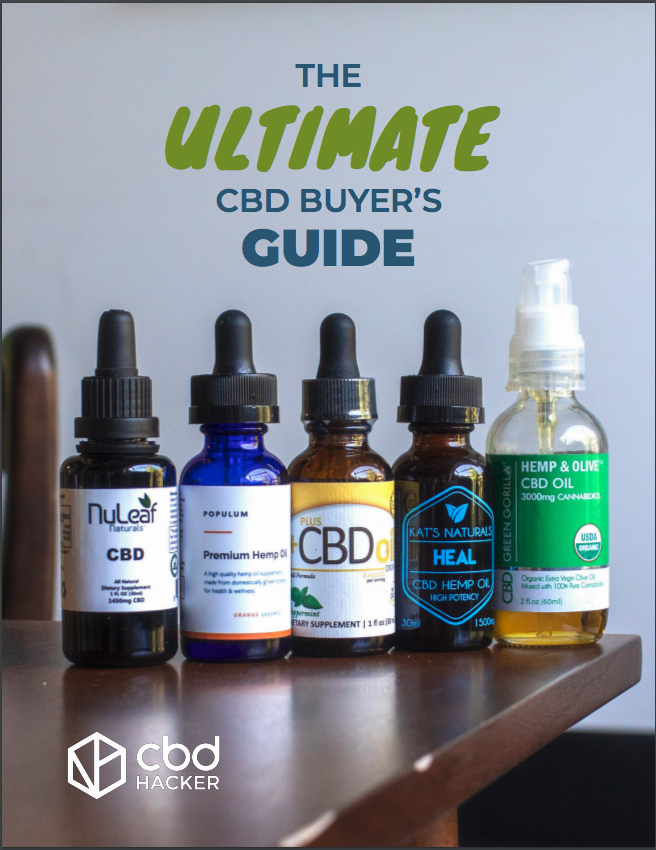“I would constantly feel this pulsing anxiety in my heart and chest,” explained Kyli from Colorado. “It wasn’t until CBD that I finally felt like myself again.”
After years of trying therapy, prescription medications, and self-help books for her generalized anxiety disorder to no avail, Kyli heard about CBD oil from some of her friends. After only three days of using CBD products, Kyli’s symptoms began to improve.
“It felt like a breath of fresh air. I could finally take on life again.”
About CBD Oil For Anxiety
Claim
CBD can help those with anxiety disorders.
Research Shows
Preclinical research supports the anxiolytic effects of CBD. Limited clinical research has found similar effects in humans, particularly with acute CBD dosing. More long-term, randomized clinical trials are needed before conclusions can be drawn.
Just the Facts
CBD oil may help with anxiety, but more research is needed.
Anxiety is something that we all face at one time or another, but for some, this fight-or-flight response hijacks their mental health. When this happens, your stress and anxiety may be a sign of an anxiety disorder. Anxiety disorders can be difficult to treat, with current medications lacking in both safety and long-term efficacy.
What does science have to say about CBD oil for anxiety? We have gathered data from scientific studies and spoke with leading experts in the field to allow you to draw your own conclusions about CBD for anxiety.
What Is Anxiety?
We all suffer from anxiety and stress from time to time. When you’re stressed, you may feel restless, uneasy, or nervous. You might experience an elevated heart rate, tight chest, shaky hands, or excessive sweating. This experience is normal, and in some circumstances, healthy.
It’s known as our fight-or-flight response. Some of the most common triggers are conflicts with those close to us, financial difficulties, or work troubles.
Anxiety disorders, however, are different. If you have an anxiety disorder, you understand all too well that there is a distinction between normal stress and clinical anxiety. The difference has to do with the source, severity, and duration of the heightened stress response.
For example, people with social anxiety disorder can experience a full-blown stress response from normal human interactions. Imagine having incredibly high anxiety just from the social niceties required of you when you check out at a grocery store.
And for those with post-traumatic stress disorder (PTSD), a previous traumatic event can lead to severe and debilitating anxiety at unexpected times, far after the real danger has disappeared.
There are five major types of anxiety disorders:
- Generalized Anxiety Disorder
- Post-Traumatic Stress Disorder (PTSD)
- Social Anxiety Disorder or Social Phobia Disorder
- Obsessive-Compulsive Disorder (OCD)
- Panic Disorder
Limited evidence suggests that CBD might be able to help with each of these anxiety disorders.
Best CBD Oils
Looking for the best CBD oil for anxiety and stress? These are just a few examples of trusted brands that we’ve fully vetted for quality:
Or, you can check out our full guide to the Best CBD Oils for Anxiety and Stress.
What is CBD Oil?
CBD is a cannabinoid that occurs naturally in both hemp and marijuana varieties of cannabis.
CBD oil is typically extracted from hemp plants, which are low in THC (tetrahydrocannabinol). That is the cannabinoid in cannabis that is primarily responsible for its psychoactive effect.
Unlike THC, CBD does not get users “high.” In spite of having no noticeable psychotropic effect, CBD does appear to have a variety of health benefits for humans.
According to a 2018 survey published in Cannabis and Cannabinoid Research, CBD is primarily used by consumers to help treat chronic pain, anxiety, and depression. Preclinical studies show potential for these and other medical conditions. But more long-term, clinical studies will determine to what extent CBD can help people with different needs.
How Might CBD Oil Help with Anxiety?
Researchers are still hard at work trying to fully elucidate how CBD might help with anxiety. What we do know is that many of CBD’s effects are a result of how it interacts with the endocannabinoid system (ECS).
The ECS is a far-reaching system of endogenous cannabinoids (endocannabinoids), their receptors, and enzymes involved in their synthesis and breakdown. There are ECS receptors in our brains, immune systems, and other cells found throughout our bodies. All vertebrates, from humans and dogs to birds and reptiles, have an ECS.
Research suggests that the ECS is involved in homeostasis, meaning that it helps to maintain balance.
One of the ways that it does so is through its involvement in the hypothalamic-pituitary axis (HPA). Our HPA plays a central role in our response to physical and mental stressors, and therefore, in anxiety.
Thanks to its role in HPA modulation, the ECS is important in regulating mood and anxiety. Through a variety of interactions with the ECS, CBD may influence anxiety disorders.

Research Highlights
2019: CBD in Anxiety and Sleep
A large case series published in 2019 in the Permanente Journal examined the effect of CBD on sleep and anxiety in a clinical population. In this case series, 72 adult patients from a psychiatric outpatient clinic received CBD for either sleep or anxiety in addition to their current treatments.
The dosage varied depending on the patient’s needs, ranging from 25 mg/day CBD to 175 mg/day CBD (lower doses were more common).
57 of 72 patients experienced a decrease in anxiety scores following the first month of CBD treatment. These scores remained decreased throughout the study’s duration.
These findings led the researchers to conclude that CBD may be beneficial for those with anxiety disorders, but it will be necessary to conduct further studies.
2015: CBD’s Potential for Anxiety Disorders
In 2015, a study published in Neurotherapeutics examined evidence from epidemiological, clinical, human experimental, and preclinical studies to assess CBD’s potential for those with anxiety disorders.
The researchers concluded that preclinical evidence “strongly supports” CBD as an acute treatment for:
- Social anxiety disorder
- Generalized anxiety disorder
- Post-traumatic stress disorder
- Panic disorder
- Obsessive-compulsive disorder
Research examining the long-term or clinical use of CBD was lacking, leading the researchers to stress the importance of further research into CBD for anxiety.
2011: CBD and Public Speaking in Social Phobia Patients
This study set out to determine how CBD might impact patients with generalized social anxiety disorder (SAD) in a simulated stressful event: public speaking. There were three groups:
- Treatment group: 12 SAD patients given 600 mg CBD before the test
- Control group: 12 SAD patients given placebo before the test
- 12 healthy controls not given any medication before the test
Each of these groups underwent a simulation public speaking test (SPST). During the SPST, the researchers recorded subjective and physiological measures.
Relative to the control group, those SAD patients in the CBD group experienced fewer cognitive impairments, less discomfort in speech performance, decreased alertness in the anticipatory speech, and reduced anxiety. In fact, the results of those in the CBD group were similar to those of the healthy control subjects.
These findings suggest that a single dose of CBD might help to inhibit the fear of public speaking, a key symptom of SAD.
2010: CBD and Generalized Social Anxiety Disorder
In the first-of-its-kind-study published in the Journal of Psychopharmacology, 10 patients with generalized social anxiety disorder (SAD) were treated with 400 mg CBD or placebo in two double-blind sessions. The researchers measured feelings of subjective anxiety and took and examined brain images.
Compared to placebo, CBD was associated with decreased subjective anxiety. There were differences in the neuroimages, suggesting that CBD did have an impact on brain activity.
What Do the Experts Say?
As it stands today, the Food and Drug Administration (FDA) has only approved one cannabis-derived drug: Epidiolex. This CBD-only formulation is approved for the treatment of certain childhood epilepsy conditions.
Other CBD products, such as the CBD capsules, tinctures, and gummies that you find online and in stores, are considered neither drugs nor supplements by the FDA.
While this may change over the next few years, this limited acceptance at a federal level in the United States has not stopped people from using CBD products. But it has left them without clear-cut guidelines on how to use CBD oil.
Fortunately, there are doctors and other experts who work with cannabinoids who can provide some guidance for consumers looking for answers.
Dr. Jamie Corroon is a naturopathic doctor and founder of the Center for Medicinal Cannabis Education. Over the years he has had multiple CBD and cannabis studies published in peer-reviewed scientific journals while working with patients to help address a variety of health concerns.
We spoke with Dr. Corroon to ask him some questions regarding the use of CBD for anxiety.
One of our biggest takeaways was that cannabis-derived therapies are very individualized. What works for one person may not have any impact on another.
Some people might find that a full spectrum hemp extract taken daily works wonders for their anxiety, while another may prefer marijuana-derived extracts that contain small quantities of THC. Furthermore, there are both responders and non-responders, meaning that what works for one person with an anxiety disorder may have no discernible impact on another person with the same condition.
If you decide to try CBD oil for anxiety, understand that it might take some patience to determine what, if any, therapy is right for you.

How to Take CBD Oil for Anxiety
We spoke with Dr. Scott Shannon, a leading researcher in CBD for anxiety as well as a practicing psychiatrist at the Wholeness Center in Fort Collins, Colorado. From his experience in both clinical and research settings, he has discovered that “low doses (of CBD) work well for anxiety.” He has found that adults typically require around 10 mg to 30 mg CBD per day, and children between 5 mg and 15 mg in a spray or edible form.
He does stress that everybody is different, explaining that “patients with previous trauma or PTSD may need more.”
When sourcing your CBD oil, Dr. Shannon recommends that you look for products extracted from the hemp plant, not the medical cannabis plant. According to Dr. Shannon, “THC can make people more anxious or agitated, so I typically don’t recommend cannabis products for anxiety.”
When should you take CBD oil for an anxiety disorder? Dr. Shannon recommends “one dose in the morning with breakfast for those with generalized anxiety disorder or social anxiety disorder or one dose at night with dinner for agitation or trouble sleeping at night.”
Dr. Corroon recommends that patients who source a hemp oil product be careful about quality. Look for a full spectrum hemp extract from a company that offers an electronic Certificate of Analysis (COA) on demand. This will show that the manufacturer is testing their products for consistency and safety. He does recommend a full spectrum hemp extract over a CBD isolate product (pure CBD).
CBD Oil for Anxiety: Expert Advice
Dosage (edibles and sprays)
Adults: 10 mg to 30 mg CBD per day
Children: 5 mg and 15 mg
Types of CBD
Look for hemp-derived products that are high in CBD and low in THC.
Look for Quality
Purchase from companies that offer a recent Certificate of Analysis (COA) to show that they are testing their products for safety and quality.
What Are CBD’s Side Effects?
CBD is not without side effects and risks. It may interact with other drugs, and some patients have experienced digestive upset and fatigue.
The higher the dosage, the greater the chance of adverse effects. Speak with your doctor before adding CBD to your daily routine, especially if you are currently taking multiple prescription medications.
Dr. Corroon offers another piece of advice: to minimize drug interactions, space out when you take CBD and when you take your other medications. One, two, or three hours between CBD and prescription medications can help to reduce the likelihood of interactions.





